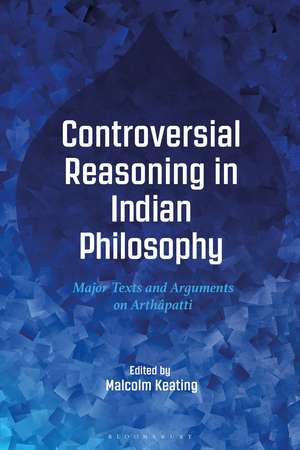Controversial Reasoning in Indian Philosophy: Major Texts and Arguments on Arthâpatti
Editat de Malcolm Keatingen Limba Engleză Hardback – 22 iul 2020
| Toate formatele și edițiile | Preț | Express |
|---|---|---|
| Paperback (1) | 198.69 lei 6-8 săpt. | +137.83 lei 4-10 zile |
| Bloomsbury Publishing – 22 mar 2023 | 198.69 lei 6-8 săpt. | +137.83 lei 4-10 zile |
| Hardback (1) | 772.37 lei 6-8 săpt. | |
| Bloomsbury Publishing – 22 iul 2020 | 772.37 lei 6-8 săpt. |
Preț: 772.37 lei
Nou
Puncte Express: 1159
Preț estimativ în valută:
147.84€ • 160.64$ • 124.27£
147.84€ • 160.64$ • 124.27£
Carte tipărită la comandă
Livrare economică 22 aprilie-06 mai
Preluare comenzi: 021 569.72.76
Specificații
ISBN-13: 9781350070479
ISBN-10: 1350070475
Pagini: 400
Dimensiuni: 156 x 234 mm
Greutate: 0.68 kg
Editura: Bloomsbury Publishing
Colecția Bloomsbury Academic
Locul publicării:London, United Kingdom
ISBN-10: 1350070475
Pagini: 400
Dimensiuni: 156 x 234 mm
Greutate: 0.68 kg
Editura: Bloomsbury Publishing
Colecția Bloomsbury Academic
Locul publicării:London, United Kingdom
Caracteristici
Features readable translations of 7 major Sanskrit works accompanied by critical notes, by an international team of experts from the USA, Singapore, Japan, UK, Austria and South Korea
Notă biografică
Malcolm Keating is Associate Professor of Philosophy at Yale-NUS College, Singapore.
Cuprins
List of FiguresList of Tables List of Contributors Preface Acknowledgments A Note on Transliteration Conventions and Pronunciation List of Abbreviations Introduction 1. Kumarila Bhatta's Explanation in Verse. Andrew Ollett and Elisa Freschi 2. Prabhakara's Long Explanation. Andrew Ollett and Elisa Freschi 3. Salikanatha's Straightforward and Lucid Gloss; Comprehensive Survey of the Epistemic Instruments. Andrew Ollett and Elisa Freschi4. Narayana Bhatta's Elucidation of Epistemic Instruments and Their Objects. Malcolm Keating5. Aksapada Gautama's Nyaya-sutra with early commentaries. Malcolm Keating6. Udayana Acarya's The Flower-Offering of Reason. Nilanjan Das7. Jayanta Bhatta's Flowers of Reasoning. Alessandro Graheli8. Gangesa Upadhyaya's Jewel of Reflection on the Truth. Stephen Phillips9. The Physical Existence of a Living Being and Kumarila's Theory of Arthâpatti. Kiyotaka Yoshimizu 10. Raghunatha on Arthâpatti. Nilanjan Das11. Against Reducing Arthâpatti. Mark Siderits 12. Arthâpatti: An Anglo-Indo-Analytic Attempt at Cross-Cultural Conceptual Engineering. Anand VaidyaTable of Important Figures, Dates, and Works English-Sanskrit Glossary Sanskrit-English Glossary Index
Recenzii
This book provides an incredible set of resources for anyone who wants to think with Indian philosophers about the kinds of reasoning practices that yield knowledge. But it also provides an accessible introduction, for those who are just beginning to explore these rich Indian debates. I recommend this book strongly!
This fine volume on the neglected topic of the epistemological status of arthapatti, a contested form of ampliative reasoning in Indian philosophy, brings together both Sanskrit primary sources in new translations and original philosophical essays. It is a first-rate contribution to the philosophical history of Indian philosophy.
This volume is a most welcome addition to the contemporary scholarship of Classical Indian epistemology. The source materials and the philosophical papers collected here bring into focus distinctive debates about arthapatti (postulation or presumption) and why they should matter to anyone interested in theory of knowledge and philosophy of language.
This fine volume on the neglected topic of the epistemological status of arthapatti, a contested form of ampliative reasoning in Indian philosophy, brings together both Sanskrit primary sources in new translations and original philosophical essays. It is a first-rate contribution to the philosophical history of Indian philosophy.
This volume is a most welcome addition to the contemporary scholarship of Classical Indian epistemology. The source materials and the philosophical papers collected here bring into focus distinctive debates about arthapatti (postulation or presumption) and why they should matter to anyone interested in theory of knowledge and philosophy of language.
